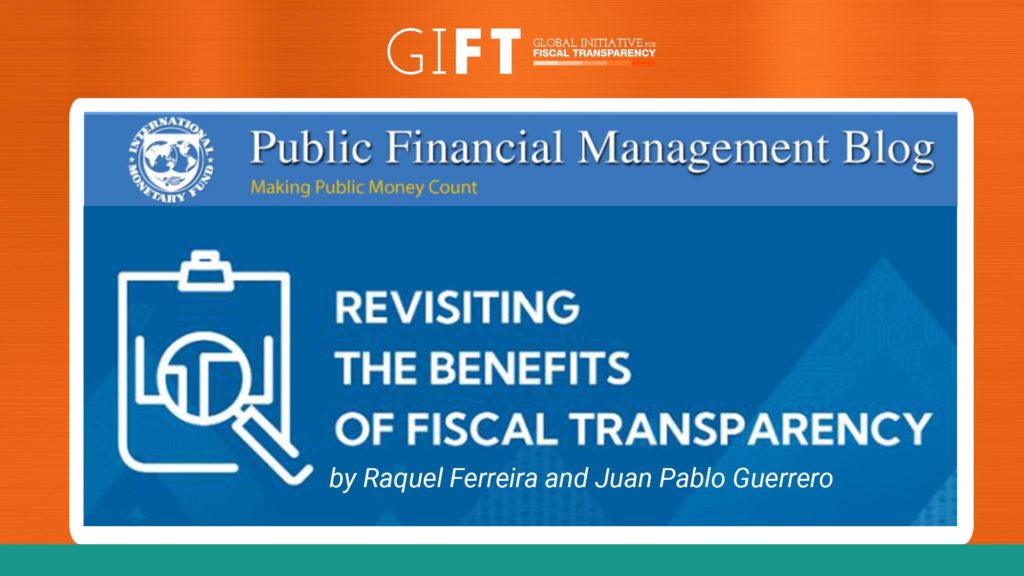Revisiting the benefits of fiscal transparency
by Raquel Ferreira and Juan Pablo Guerrero[1]
This blog is also published by the International Monetary Fund (IMF) here.

The recent release of the International Budget Partnership’s 2021 Open Budget Survey is a timely reminder that fiscal transparency improvements need to be actively pursued by governments if they are to gain traction. It is especially important that the publication of quality information across the fiscal policy cycle becomes embedded in a government’s routine operations. However, what motivates a country to start on this fiscal transparency journey and then to continually pursue improvements?
There are many answers to this question, some simpler than others. A basic one, on the assumption that politicians and public officials want what is best for the development of their countries, is that fiscal transparency contributes to this development and importantly that its benefits outweigh its costs. Governments have scarce resources to work with, and naturally want to get bangs for their bucks.
Several studies over the years have shown a generally positive association between fiscal transparency and improved fiscal policy outcomes, governance, as well as many socio-economic and human development indicators. Having this evidence helps convince observers that our constant push for fiscal transparency is based on established facts and not wishful thinking. As such, GIFT welcomes the publication of the most recent comprehensive study by Martin Haus, Paolo de Renzio and Joachim Wehner – “(When) Do Open Budgets Transform Lives? Progress and Next Steps in Fiscal Openness Research”. This paper is a timely update of the first comprehensive review of the topic by two of these authors, published in 2015 – “The Impacts of Fiscal Openness: A Review of the Evidence”.
This research creates an opportunity to revisit the many benefits of fiscal transparency and to broaden public awareness of these benefits. In brief, studies have shown that fiscal transparency leads to:
- Higher tax collections: When governments are more inclusive and transparent, citizens have greater trust in them, and are more willing to pay their taxes, which can reduce enforcement costs and increase collections.
- Increased demand for sovereign debt and lower borrowing costs: The amount that lenders are willing to lend and to charge borrowers for doing so largely depends on the risks associated with that lending. A lack of fiscal transparency creates uncertainty and increases risk perceptions. It may also increase a country’s credit spreads.
- Lower budget misallocations and capture: Improved disclosure of budget information can reduce misallocations and promote accountability by helping oversight institutions to hold governments to account. It also may incentivize citizens to monitor governments, and public officials to refrain from corrupt behaviour. Public access to information on local projects can be a powerful deterrent to the capture of funds at the subnational level. As for procurement, it has been found that more disclosure, especially during the call for tenders, improves monitoring by bidding firms, thereby reducing a contracting organization’s share of contracts awarded on the basis of a single bid and the likelihood of corrupt behaviour. Single bidder contracts are on average more expensive, so this can also lead to significant potential savings.
- Greater electoral accountability of public institutions: The media, interest groups, and concerned communities are likely to use published information to exert pressure on public authorities to respond, explain, and justify their budgetary and fiscal decisions. For instance, studies show that the publication of timely audit reports is likely to reduce corruption and enhance electoral accountability, especially when the dissemination of these reports is supported by local media. Random audits reduce corruption, predominantly by increasing the chances of a police crackdown or a conviction in court. The effectiveness of external audits is however reduced where auditors lack independence, and where auditees can anticipate the timing of audits relative to elections, or otherwise adjust their behaviour strategically to weaken the detection or consequences of poor governance.
- Budget credibility and improved development outcomes: Fiscal transparency reduces the government’s informational advantage making it more likely that it will implement and undertake its programs in line with its publicly released plans and projections. Public participation in the budget process can lead to improved development outcomes, as it empowers the public not only to understand the priorities that the government is pursuing but also to contribute to these choices and the better design of government policies. For example, studies have found that fiscal transparency is associated with higher budget execution rates in the health and the education sectors, and better projections of GDP growth and inflation.
Thus, the evidence points to numerous potential benefits waiting to be secured. The fact that much improved fiscal transparency has been achieved by many countries across the globe at different levels of development, also means that it is attainable when there is a political will. Help us spread the word in motivating those who may still need convincing!
